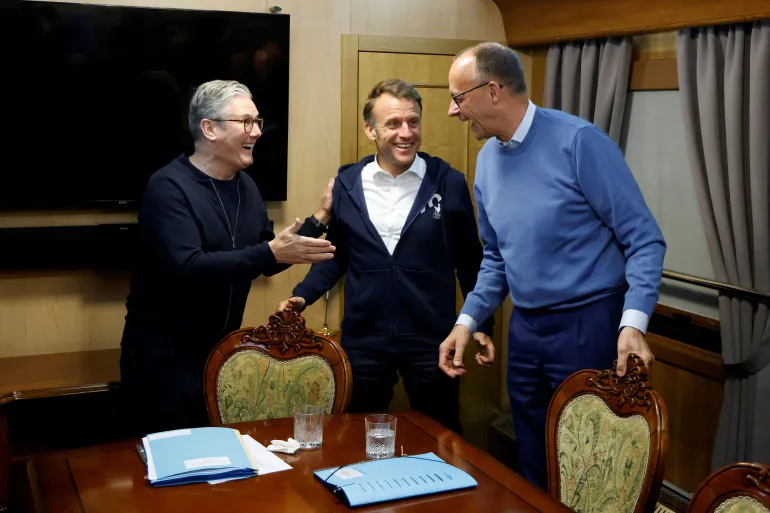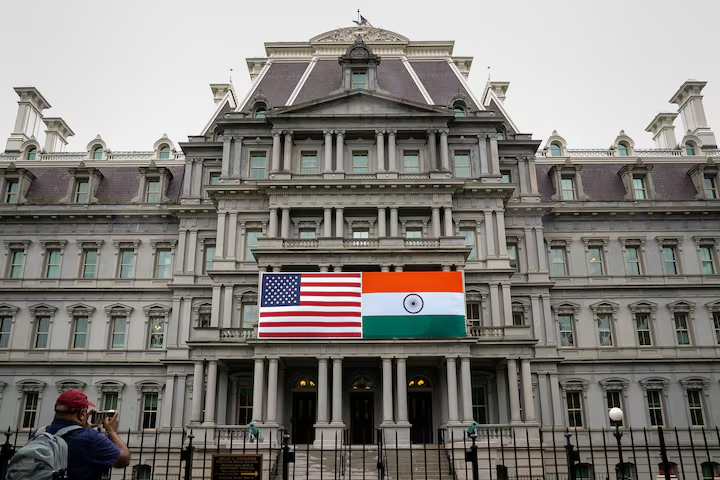A viral video suggesting that French President Emmanuel Macron, British Prime Minister Keir Starmer, and German Chancellor Friedrich Merz were seated at a train table with what appeared to be a packet of cocaine has been thoroughly debunked. The allegations, first circulated on social media and amplified by conspiracy theorists and pro-Russian accounts, have been dismissed by government officials and exposed as part of a broader disinformation campaign.
The controversy began when a short video clip from a recent trip by the three European leaders was posted online. The footage showed them sitting together on a train, apparently engaged in discussions related to the Ukraine conflict. However, what caught the attention of conspiracy theorists was a small white object on the table, which some users alleged resembled a small bag of white powder—implying drug use among the leaders.
Among those who circulated the claim was American conspiracy theorist Alex Jones. Jones posted the video to his social media platforms, captioning it with inflammatory suggestions that the leaders were caught with drugs in plain sight. His post quickly gained traction, particularly among pro-Russian and anti-Western communities online, with many users echoing or amplifying the baseless claim.
Adding to the controversy, Russian Foreign Ministry spokeswoman Maria Zakharova commented on the video. Without directly accusing the leaders of drug use, she insinuated wrongdoing by posting a sarcastic remark about the clip, thus fueling the misinformation narrative. Zakharova’s post was picked up by Russian state media outlets and circulated widely within pro-Kremlin information networks.
In response to the growing speculation, the French government issued a firm denial. The Élysée Palace stated that the object seen in the video was nothing more than a tissue. “It was a tissue, used for blowing one’s nose, and nothing more,” a spokesperson clarified. The palace also condemned the viral claims, labeling them a manipulation attempt and part of an organized effort to undermine European leadership.
German officials also dismissed the allegations as absurd. A government representative emphasized that such rumors were unfounded and dangerous, serving only to distract from the serious discussions taking place among the leaders. Similarly, Downing Street refused to comment on the “nonsense” circulating online but reiterated the UK’s commitment to standing with allies on critical matters such as the Ukraine crisis.
Independent media and fact-checkers who examined the original footage and accompanying high-resolution photographs confirmed that the object was clearly a tissue. There was no evidence to support the assertion that drugs were present on the table or that any illicit activity had taken place during the meeting.
Experts have pointed to the broader context of disinformation campaigns targeting Western governments, particularly those that have taken strong stances against Russia’s invasion of Ukraine. The viral cocaine claim fits within a pattern of attempts to delegitimize European leaders and create division among Western allies.
Analysts say this type of narrative manipulation is increasingly common in the digital age, where brief, out-of-context video clips can be weaponized to spread falsehoods. By seeding doubt and scandal, disinformation campaigns seek to erode public trust in democratic institutions and elected leaders.
Ultimately, the viral claim about cocaine on the table during the Macron-Starmer-Merz meeting has no factual basis. It has been thoroughly debunked by official sources and independent media. The object seen in the video was a tissue—nothing more—and the narrative that followed was a product of coordinated misinformation efforts, not reality.
In an era of deep political polarization and rampant online disinformation, this episode serves as a reminder of the importance of verifying facts before sharing viral content.
Source; Al Jazeera



